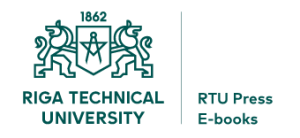Metodes izstrāde koda ģenerēšanai no divpusložu modeļa
Summary of the Doctoral Thesis
Konstantīns Gusarovs, Riga Technical University, Latvia
![]() http://orcid.org/0000-0002-3269-7506
http://orcid.org/0000-0002-3269-7506
Software engineering is continuously evolving, and its tasks are expanding. Nowadays, it includes not only software code development, but business process analysis as well. Information that is gained as a result of such analysis can be used for model that describe processes under automation development. Model driven software engineering also includes application of such models for automated software code or other artefact generation. In comparison to so called “model-based” engineering, model driven engineering uses strictly defined models and its processing algorithms during whole software lifecycle.
While ideas, that model driven software engineering is based upon, seem to provide several benefits – for example, initial system representation understood not only by developers, but also by business area experts and, possibly, customers – its adoption is still in the initial phase. This can be explained by both the low level of automation, as well as, inappropriate source model usage.
In this thesis, author offers a possible solution to this problem by defining transformation rules for so called Two-Hemisphere Model. This model is a combination of business process and concept diagrams and offered transformation rules allow for a software code generation from it. Additionally, improvements for the Two-Hemisphere model are offered. These improvements are required for enabling of code generation. Also, an algorithm for defining class relationships that can be used also outside of model driven software engineering is described. In this thesis author provides an insight to defined transformation rules by using pseudocode, as well as, an example of its’ application and resulting Java programming language code that was generated from the example model.
Additional information
| DOI | |
|---|---|
| Hyperlink | |
| Defence date | 01.03.2021. |
| ISBN (print) | 978-9934-22-576-5 |
| ISBN (pdf) | 978-9934-22-577-2 |
| Format | |
| Pages | 40 |
| Published online | |
| Publisher | RTU Press |
| Country of Publication | Latvia |
| Publication language |
You must be logged in to post a review.




Reviews
There are no reviews yet.